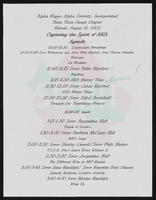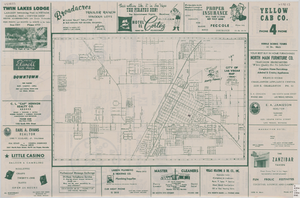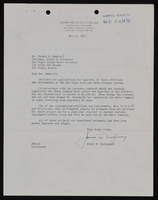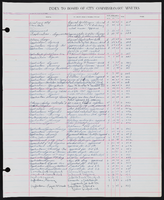Search the Special Collections and Archives Portal
Search Results

Transcript of interview with Faye Duncan Daniel by Claytee D. White, October 18, 1996
Date
Archival Collection
Description
Interview with Faye Duncan Daniel conducted by Claytee D. White on October 18, 1996. Beginning in clerical work at the Nevada Test Site, Daniel rose to become the Assistant Hotel Manager at Union Plaza Hotel and Casino. She established the Hotel Managers Association and the Professional Black Women's Alliance. After leaving the gaming industry, Daniel returned to school to train for a career in education. She worked closely with the Displaced Homemaker Program at the Community College of Southern Nevada and later with Help Centers of Southern Nevada.
Text

Transcript from interview with Helen Anderson and Karen Walker by Claytee White and Barbara Tabach, February 21, 2014
Date
Archival Collection
Description
Helen Anderson came to Las Vegas in 1962 from Arkansas, and had her daughter, Karen, in 1967. The pair discusses the family business, Hamburger Heaven, and other businesses on Jackson Street and the Westside. They also talk about hte changes in the neighborhood and their work with the West Las Vegas Citizens for Hope group, and Karen's family services business.
Text
Paul Senzaki, Alan Hess, and Charlie White III roundtable interview
Identifier
Abstract
Roundtable interview with Paul Senzaki, Alan Hess, and Charlie White III conducted by Stefani Evans and Claytee D. White on September 09, 2016 for the Building Las Vegas Oral History Project. Senzaki and White III discuss their separate work on the development of many Las Vegas, Nevada Strip hotels and casinos. Hess talks about his expertise on Las Vegas architecture.
Archival Collection

Meeting minutes for Consolidated Student Senate, University of Nevada, Las Vegas, November 7, 1978
Date
Archival Collection
Description
Text

Transcript of interview with Morris "Moe" Dalitz by Brenda Baxter, November 4, 1977-March 30, 1978
Date
Description
Interview with Morris "Moe" Dalitz by Brenda Baxter, on several dates in late 1977 to early 1978. In this interview, Dalitz talks about his business and career endeavors before coming to Las Vegas, which included a laundry service and military service. Dalitz partnered with Wilbur Clark and became a successful hotel and casino owner in Las Vegas, as well as a real estate developer with properties including the Boulevard Mall and Sunrise Hospital.
Moe Dalitz was born in Boston in 1899, and soon after his family moved to Detroit, Michigan and where his father started a linen supply company. In 1930, during Prohibition, Moe moved to Cleveland, Ohio and he became involved with the then-illegal liquor business. At the age of 41, Dalitz enlisted in the Army and was stationed at Governors Island. Moe was put in charge of laundries and dry cleaning because of his experience in the laundry business. He played an important role in creating mobile laundry units that were used in the front lines in North Africa. His ingenuity won him a non-combatant award for his "unusual interest, ingenuity and talents" applied during his service. At the end of war, Moe returned to Cleveland, where his partners were successfully carrying on their business. It was then that they decided to go into the casino-nightclub business, opening nightclubs in Ohio and Kentucky. A couple years later, Moe and his partners met Wilbur Clark and agreed to finance his inactive project in Las Vegas. Thus, in 1950, the Desert Inn Hotel and Casino opened, and Moe Dalitz ushered in a new era for the city. Moe and partners continued to elevate the sophistication of the Strip when they acquired the operating lease to, and later part ownership of, the Stardust Hotel and Casino. Moe was instrumental in bringing the French Lido de Paris show to the Stardust, which was considered the most spectacular nightclub show produced in Las Vegas at its time. In addition to his gaming industry ventures, Moe engaged in significant real estate development, along with partners Allard Roen, Merv Adelson and Irwin Molasky. Their projects included Sunrise Hospital, The Boulevard Mall and Las Vegas Country Club as well as La Costa Resort and Spa in California. At the time of the interview, Moe was involved with the construction of a downtown hotel and casino. Moe Dalitz was the recipient of the Humanitarian Award from the American Cancer Research Center, and supported the Variety Club and the Home of the Good Shepard, amongst other charities.
Text

Alpha Kappa Alpha Sorority, Theta Theta Omega Chapter retreat and workshop documents
Date
Archival Collection
Description
From the Alpha Kappa Alpha Sorority, Incorporated, Theta Theta Omega Chapter Records (MS-01014) -- Chapter records file.
Text

Street map of the city of Las Vegas, 1954
Date
Description
Image



